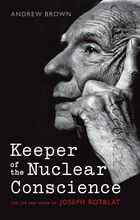
- A fascinating biography covering all aspects of the life of the scientist and peace activist
- Rotblat's life and work poses important questions about science and society
- A biography rich in historical and personal detail from the interwar period, through to World War II and the Cold War
- The story of Rotblat's life ranges from his work as a Jewish nuclear scientist working on the Manhattan Project, to one of the prime architects of the anti-nuclear movement, a founder of Pugwash, and the winner of a Nobel Peace Prize, all set against a backdrop of his own personal tragedy
- Written by a distinguished biographer with full access to the archive of Rotblat's paper
Joseph Rotblat was the Jewish nuclear scientist whose disillusionment with nuclear weapons encouraged him to become one of the prime architects of the anti-nuclear movement, and resulted in his lifelong efforts to promote social responsibility in science. His founding of Pugwash and his humanitarian work ultimately led to his being awarded the Nobel Peace Prize.
Rotblat's life, from his boyhood in Warsaw under siege and occupation in World War I to an active old age that brought honours and public recognition, is a compelling human story in itself. What gave it significance is the single-minded dedication to peaceful causes, particularly through his pursuit of nuclear disarmament. A key member of the British team that demonstrated the feasibility of the atomic bomb, he was so appalled by the use of the bombs against the Japanese that he founded the Pugwash organization to engage scientists from East and West to prohibit weapons of mass destruction.
The story of his life reflects his global actions and his efforts were acknowledged when he was jointly awarded, with Pugwash, the Nobel Peace Prize in 1995. Set against a backdrop of profound changes to the global order - World War II, the Cold War, and the collapse of the Soviet Union, we also learn of his own personal tragedy.
Andrew Brown's biography sets out a life whose work poses deep and important questions about science and society. This compelling account draws on full access to Rotblat's archives and presents the full scope of his life: his childhood overcoming poverty and anti-Semitism, his efforts to become a scientist in Warsaw, his work on Britain's nuclear programme, his lifelong dedication to peaceful causes, and his determination to uphold the ethical application of science. Ultimately, we discover a great man whose profound conscience shaped his life and work, and the legacy he leaves today
Rotblat's life, from his boyhood in Warsaw under siege and occupation in World War I to an active old age that brought honours and public recognition, is a compelling human story in itself. What gave it significance is the single-minded dedication to peaceful causes, particularly through his pursuit of nuclear disarmament. A key member of the British team that demonstrated the feasibility of the atomic bomb, he was so appalled by the use of the bombs against the Japanese that he founded the Pugwash organization to engage scientists from East and West to prohibit weapons of mass destruction.
The story of his life reflects his global actions and his efforts were acknowledged when he was jointly awarded, with Pugwash, the Nobel Peace Prize in 1995. Set against a backdrop of profound changes to the global order - World War II, the Cold War, and the collapse of the Soviet Union, we also learn of his own personal tragedy.
Andrew Brown's biography sets out a life whose work poses deep and important questions about science and society. This compelling account draws on full access to Rotblat's archives and presents the full scope of his life: his childhood overcoming poverty and anti-Semitism, his efforts to become a scientist in Warsaw, his work on Britain's nuclear programme, his lifelong dedication to peaceful causes, and his determination to uphold the ethical application of science. Ultimately, we discover a great man whose profound conscience shaped his life and work, and the legacy he leaves today